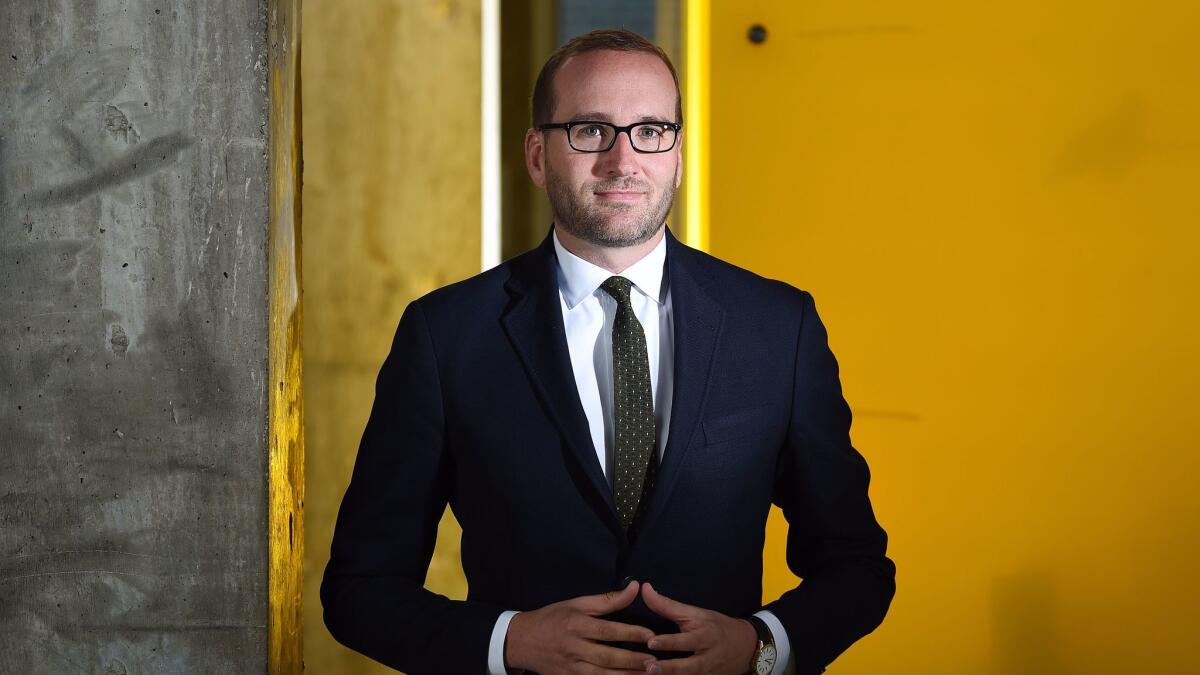Q&A: HRC’s Chad Griffin on how 2017 politics have led LGBTQ resistance back to its roots

In November 2008, 35-year-old Chad Griffin stormed the boulevards of West Hollywood alongside thousands of anguished, teary-eyed protesters who, like him, were reeling in the immediate aftermath of
Now, as president of the
In light of nationwide challenges to LGBTQ citizens, Pride festivals across the nation have shifted from what has largely become a jaunty, celebratory affair. Instead, 2017’s Pride events will call on the movement’s origins as fierce, persistent stamping grounds for grassroots mobilization.
The HRC, Griffin says, has a multi-pronged game plan to “fight back” against an administration that he calls the “grandest enemy” the LGBTQ community has witnessed in modern times.
From the HRC’s headquarters in Washington, D.C., Griffin spoke to The Times about the political catalysts that have sparked this nationwide shift toward resistance, the ways in which they impact the LGBTQ community and the HRC’s role in supporting the movement.
This year's Pride carries quite a bit more weight than it might have in years past. Can you speak more about the motivations behind the #ResistMarch?
It is both necessary and appropriate. It's necessary because this administration and this president has attacked the LGBTQ community — and, quite frankly, all minority communities — since the day he walked into the Oval Office. And our job is to resist, to fight back and to keep fighting. That, ultimately, is how we can stop the rollbacks on our rights and how we can move forward with the protections that our communities deserve.
And let me say this: It’s appropriate because this is actually what Pride was founded upon. Pride was created out of a resistance. It was created by brave and bold people who stood up and who fought back — at the Stonewall Inn in New York or at the Black Cat in Los Angeles or in the Compton Cafeteria riots. Brave LGBTQ people who stood up and fought back and said, "Enough is enough." So, in many ways, this weekend … is our communities getting back to our roots.

How is the HRC working to empower Americans to resist or to "fight back”?
There's no better example than what we did this past election in North Carolina, where we had an elected official that was determined to attack our community and to roll back our rights. [The HRC campaigned against HB2, which codified how transgender people could use bathrooms. Former Gov. Pat McCrory lost his reelection bid in 2016.] And to, especially and unconscionably, attack transgender people. So our organization came together, and we organized thousands upon thousands of voters all across the state. We invested a tremendous amount of resources in organizing and mobilizing the community and our allies in North Carolina. And on election day, we sent a message to the governor and to anti-equality politicians across this country: If you come after our community, we're coming after you on election day.
And we intend to take that model and replicate it — not just as it relates to this president, but also as it relates to other anti-equality politicians in states all across this country.
Pride was created out of a resistance. It was created by brave and bold people who stood up and fought back.
— Chad Griffin
Did the HRC revamp its campaign trajectory when Trump was elected? Were you prepared for it?
Yes, without question, our strategy shifted. Overnight, we literally went from having a partner in Washington, a partner in the White House and partners throughout the federal branch of government who were focused on furthering the civil rights of LGBTQ people and all minority communities, to having enemies in each and every one of those places. Our community has not seen an enemy like this in modern times. This administration is against everything that our community stands for and has fought for.
You're going to speak at the #ResistMarch this weekend in Los Angeles. What do you want LGBTQ communities to know? What do they need to hear right now?
Well, there's two things that are important. One, is that we all stand on the shoulders of trailblazers and giants who came before us. They've shown us the way on how to fight back against discrimination and oppression in this country. So this is nothing new for us. We're just getting back to our roots. And there's no place where our community has been more active than in Los Angeles and in the state of California.
Two, is that this is just the beginning. That the march has to continue every single day in the weeks, in the months and in the years ahead, until we oust the anti-equality politicians in states across this country and, ultimately, in this White House. And I think that is an important message for all of us. We have to channel that energy at the #ResistMarch in L.A. into action every day after that. So while we'll all be standing on that stage in unity and in coalition, we all have to remember that's just our first step. The most important steps we take will be the next day, the next day and the day after that.
The biggest entertainment stories
Get our big stories about Hollywood, film, television, music, arts, culture and more right in your inbox as soon as they publish.
You may occasionally receive promotional content from the Los Angeles Times.







